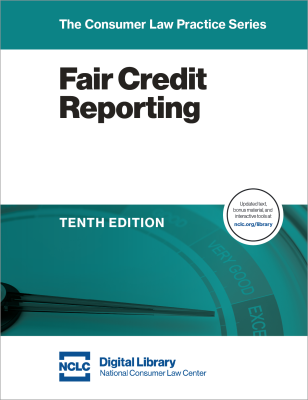On July 1, 2021, the Consumer Financial Protection Bureau (CFPB) issued an Enforcement Compliance Bulletin (hereafter Rental Reporting Bulletin) on consumer reporting issues involving tenant screening reports as well as the reporting of rental information on credit reports. This article outlines key aspects of this “Rental Reporting Bulletin,” highlights the most important implications for practitioners representing renters, and discusses how it supports states’ ability to enact protections related to tenant screening.
Looming Rental Eviction Crisis and Consumer Reporting Consequences
As of the first week of June, 14% of all renter households—5.8 million renters who are mostly low-wage workers and disproportionately people of color—were behind on rent payments. The federal moratorium on evictions imposed by the Centers for Disease Control and Prevention expires on July 31, 2021. Furthermore, neither the CDC moratorium nor state-imposed moratoria absolve renters from making rent payments or provide for formal policies allowing renters to defer them. The federal government’s Emergency Rental Assistance program can be used to address rent arrears, but it has been incredibly slow to reach tenants. Some tenants may be evicted even as they attempt to access rental relief funds.
Renters who are evicted or owe rent arrears when the CDC or state moratoria expire will not only face the immediate harm of losing their housing, but also a host of other devastating long-term consequences, including the inability to secure safe and affordable new housing. Although most landlords do not regularly report rent payments to the nationwide consumer reporting agencies (CRAs), they frequently refer unpaid rent to collection agencies, many of whom regularly report debts to the nationwide CRAs. Eviction records are not included in traditional credit reports, but those records will show up on tenant screening reports. Tenant screening reports are described at NCLC, Fair Credit Reporting § 2.3.6.3.3.
Landlords often automatically reject applicants with eviction case records as well as those who are alleged to owe money to former landlords. Because most landlords use tenant screening reports that include rental history information and credit information, a damaged credit report and eviction records both seriously hinder a renter’s ability to secure new housing. This could force the renter to turn to landlords who charge above-market rates for low-quality housing or could even lead to homelessness. This would likely have a disproportionate impact on Black and Latinx renters, who already had higher eviction rates before the COVID-19 emergency.
In May 2021, NCLC and 142 other organizations sent a letter urging the CFPB to take action to prevent these dire consequences for renters by prohibiting debt collectors from reporting rental arrears to nationwide CRAs if the renter was covered by the CDC or a state moratorium, or at a minimum, if the landlord received rental assistance funds or the renter attempted to obtain such funds and the landlord refused to cooperate.
CFPB Issues Rental Reporting Bulletin
The CFPB issued its Rental Reporting Bulletin on July 1, 2021. It generally reminds landlords, debt collectors, and CRAs of their obligation to accurately report rental and eviction information under the Fair Credit Reporting Act (FCRA) and its implementing regulation, Regulation V. The bulletin warns CRAs and furnishers they will be held accountable, and that the CFPB may take enforcement action, if they fail to comply with their accuracy and dispute obligations with respect to rental information. The Bulletin discusses the Bureau’s concerns with rental reporting specifically related to the pandemic as well as general, longstanding problems in tenant screening.
Bulletin Identifies 3 Areas of Concern for Rental Reporting During the COVID-19 Pandemic
The Rental Reporting Bulletin lays out at great length the devastating economic impact of the COVID-19 pandemic on renters, providing numerous statistics and background information for a looming eviction crisis. It cites actions that the CFPB has already taken to protect renters, including:
- Joint Statement by CFPB Acting Director Uejio & FTC Acting Chairwoman Slaughter Issue on Preventing Illegal Evictions;
- Interim Final Rule, Debt Collection Practices in Connection With the Global COVID-19 Pandemic (Regulation F) (discussed in the NCLC Digital Library article, Effective May 3 New Federal Debt Collection Rule on Eviction Practices).
With respect to rental consumer reporting, the CFPB flagged the following issues as areas of concern:
- Reports that some landlords may have evicted tenants in violation of applicable eviction moratoria. While the Bulletin does not explicitly state so, one could argue that the reporting of such evictions might be misleading because they omit a critical fact, i.e., the violation of the moratorium. In most but not all federal Courts of Appeals, information that is misleading in a material manner is considered inaccurate. See NCLC, Fair Credit Reporting § 4.2.4.
- Negative information in tenant screening reports related to hardship experienced during the pandemic may not be a reliable predictor of a consumer’s ability to be a good tenant. More specifically, the Bureau states that information related to evictions and rental debt arising out of the COVID-19 economic crisis as well as the use of “pre-pandemic relationships and scoring models on pandemic data” may lead to unreliable conclusions about a consumer’s future performance as a renter. Rental Reporting Bulletin, at 3.
- With respect to furnishers, including debt collectors, the failure to account for COVID-19-related aid or other protections when reporting overdue rent amounts to the CRAs and the inclusion prohibited penalties or fees. As the Bureau explains, this could lead to inaccurate consumer reports. Rental Reporting Bulletin, at 13–14.
Bulletin Identifies Four Longstanding Problems with Tenant Screening CRAs and Potential Furnisher Problem
In addition to pandemic-specific issues, the Bulletin discusses long-standing problems with the accuracy of tenant screening reports. The CFPB raises these issues because they likely will be exacerbated by the anticipated increase in negative rental information in the consumer reporting system and an increase in people seeking rental housing in the wake of the pandemic. Rental Reporting Bulletin, at 3, 10. The Bureau specifically lists the following as cause for particular concern:
- The risk that the procedures that some tenant screening companies use to match public records and other rental information to individual consumers may lead to mismatched reports. The Bureau notes that the risk of mismatched reports may be greater for Hispanic, Black, and Asian individuals due to less surname diversity than among white individuals.
- The inclusion of incomplete information, such as an eviction filing that does not include disposition information, in a tenant screening report.
- The inclusion of multiple entries for the same eviction action in the same tenant screening report.
- The reporting of eviction information of that has been sealed or expunged.
With respect to furnishers, the CFPB noted complaints it received that renters were concerned about debt collection activities following evictions, including attempts to collect questionable charges and fees (and presumably reporting such amounts on credit reports). The CFPB noted similar issues in a Complaint Bulletin that it also issued in July 2021.
Areas of CFPB Scrutiny and Potential Enforcement
The Rental Reporting Bulletin warns CRAs and furnishers that the CFPB plans to pay particular attention to rental reporting. In general, the CFPB plans to scrutinize whether CRAs and furnishers are reporting accurate rental information and complying with their dispute obligations, including conducting timely and reasonable investigations. Specifically, the Bureau flagged the following issues:
- Whether CRAs are using a sufficient number of identifiers to match consumer report information to the consumer who is the subject of the report, including whether CRAs are using name-matching procedures or limited identifiers likely to heighten the risk of inaccurate matching.
- Whether CRAs are reporting eviction information that is inaccurate, incomplete, or misleading (such as may result from a failure to have reasonable procedures to report information about the disposition of an eviction filing, to prevent the inclusion of multiple entries for the same eviction action in the same consumer report, or to prevent the inclusion of eviction information that has been sealed or expunged).
- Whether furnishers are providing information about rental arrearages that include amounts that were already paid on behalf of a tenant through a government grant or relief program, such as the Emergency Rental Assistance programs.
- Whether furnishers are providing information about rental arrearages that include fees or penalties that CARES Act § 4024(b) or other laws prohibit charging.
Implications of CFPB Bulletin for FCRA Litigation
The Rental Reporting Bulletin provides useful support and guidance for practitioners representing clients with inaccurate tenant screening reports or rent arrears collection items in credit reports. It is evidence that the CFPB, which is the administrative agency that not only enforces but also interprets the FCRA, considers errors in rental reporting to be very damaging and critical. The seriousness of harm is a factor in the balancing tests under both section 1681e(b) and section 1681i, which both weigh the potential harm from an inaccuracy against the burden of safeguarding against such inaccuracy. See NCLC, Fair Credit Reporting § 4.4.5.1.2 (reasonableness and balancing test for § 1681e(b) claims); id. § 4.5.3.4.3 (balancing test for § 1681i claims).
The fact that the CFPB flagged specific issues for scrutiny could support an argument that certain information is inaccurate. The vast majority of courts have held that the plaintiff must establish that information is inaccurate in order for there to be a violation of the FCRA’s accuracy and dispute resolution requirements. NCLC, Fair Credit Reporting §§ 4.4.2, 4.5.3.2, 6.10.2.4. The Bulletin could support arguments that the following information is inaccurate:
- Reporting of rental arrearages that include amounts that were already paid on behalf of a tenant through a government grant or relief program, such as the Emergency Rental Assistance programs.
- Reporting of rental arrearages that include fees or penalties that CARES Act § 4024(b) or “other laws” prohibit charging. Such other laws could include state laws that prohibit the charging of certain fees, or that establish procedural requirements before such fees can be charged (e.g., laws that require documentation of a unit’s condition pre-tenancy and post-tenancy before fees for damages can be charged).
- Reporting evictions that were conducted in violation of the CDC or a state-mandated eviction moratorium without disclosing such violation.
- Credit scoring or tenant scoring models that treat pre-pandemic and pandemic-era information in the same manner, if they in reality have different predictive value.
Furthermore, the Rental Reporting Bulletin could provide support for the argument that certain practices are not reasonable procedures for ensuring maximum possible accuracy under FCRA § 1681e(b), such as:
- Use of name-only matching or insufficient identifiers for matching purposes.
- Reporting an eviction filing that does not include disposition information.
- Multiple entries for the same eviction action in the same tenant screening report.
- Reporting of eviction information that has been sealed or expunged.
Using the Bulletin to Fight Claims That the FCRA Preempts State Law
A few states have adopted laws to protect renters during and in the wake of the pandemic, and many more states may be interested in doing the same. One barrier to such laws is the threat of preemption by the federal FCRA. FCRA preemption is complicated and messy, with three different types of preemption of varying severity affecting different sections, and even subsections, of the Act. See NCLC, Fair Credit Reporting § 10.7 (discussing FCRA preemption in detail). When states propose legislation to protect renters, the consumer reporting industry has responded aggressively by claiming such laws would be preempted.
In the Rental Reporting Bulletin, the CFPB cites laws enacted in Oregon (2021 Or. Laws Ch. 39) and Illinois (735 Ill. Comp. Stat. 5/9-122) as examples of actions taken by states and local governments to prevent the reporting or use of rental information that occurred during the pandemic. The Bureau’s favorable citation to state law supports arguments that the FCRA does not preempt these state consumer reporting provisions or similar statutes. As the administrative agency charged with implementing and interpreting the FCRA, the CFPB’s interpretation of the scope of federal preemption under the FCRA should be at least influential or persuasive. See 15 U.S.C. § 1681s(e) (CFPB authorized to promulgate regulations to administer and carry out the purposes and objectives of FCRA). See generally Gregory M. Dickinson, Calibrating Chevron for Preemption, 63 Admin. L. Rev. 667 (2011); Catherine M. Sharkey, Inside Agency Preemption, 110 Mich. L. Rev. 521 (2012).



